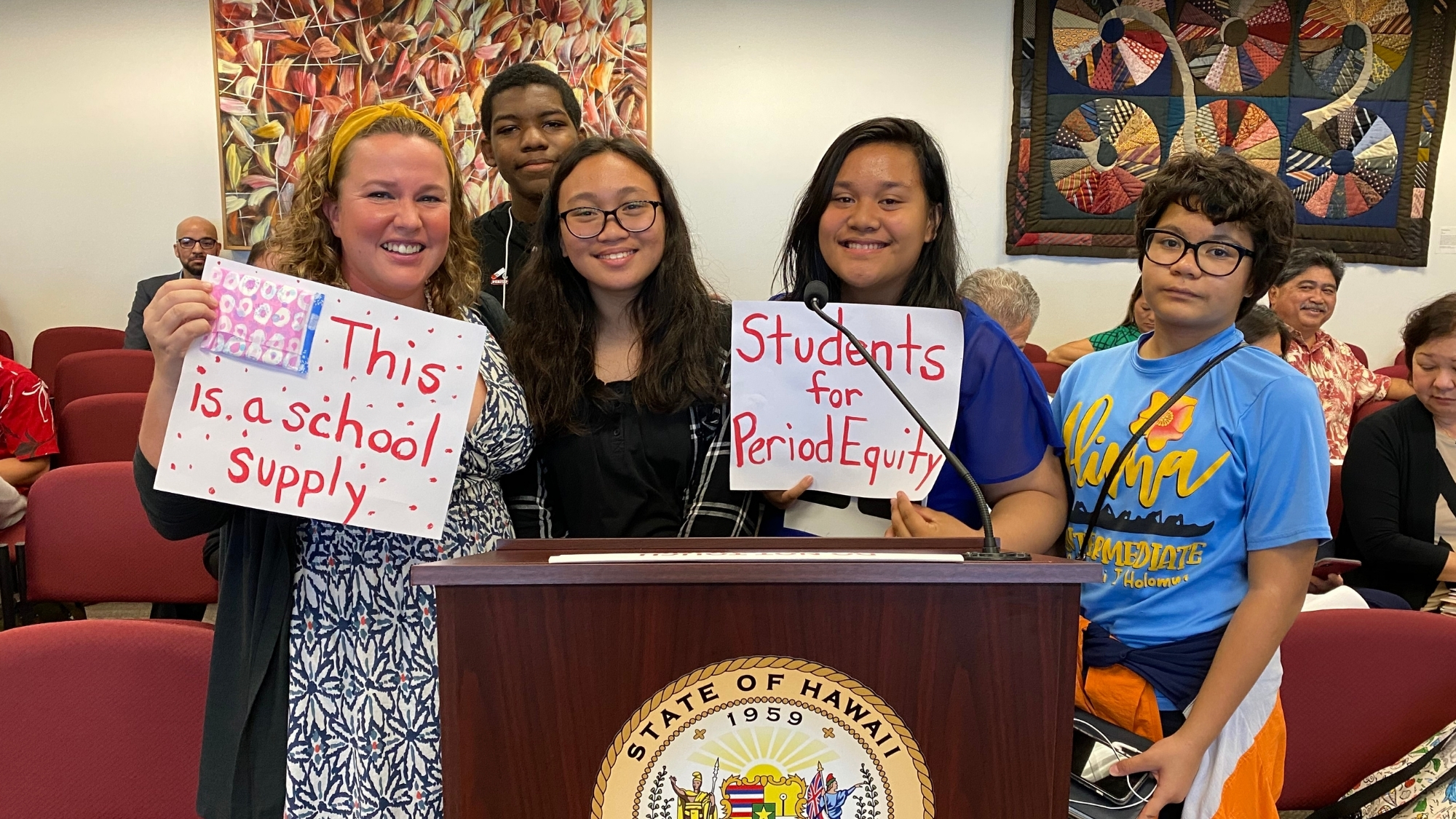It will help raise awareness about students’ lack of access to menstrual supplies
Posted: July 1, 2021
Delegates to the National Education Association’s Representative Assembly (NEA RA) Thursday overwhelmingly approved a proposal authored by a Hawaii teacher that directs the NEA to raise awareness about public school students’ lack of access to menstrual supplies.
Sarah Milianta-Laffin, a teacher at Ilima Intermediate in Ewa Beach and first-time delegate to the NEA RA, introduced new business item 11 which said, “NEA will use online platforms to raise awareness about the impact of period poverty (the lack of access to menstrual supplies) on our students.”
A large majority of 95 percent of the NEA delegates voted to approve Milianta-Laffin’s measure at the NEA’s first-ever online RA, in which thousands of educators from around the country debate, vote and approve policies and the direction of the nation’s largest union. The NEA RA is the largest elected deliberative body in the world with approximately 5,600 participants this year.
No delegates spoke against the period poverty proposal.
What is period poverty?
Addressing the NEA RA by telephone, Milianta-Laffin told fellow delegates, “Period poverty is defined generally as the inability to access menstrual products during menstruation.”
“When I talk to teachers about period poverty, I often get quizzical looks. I’m officially that ‘weird teacher’ who talks about periods. But what many teachers don’t know is how deeply period poverty hurts our students. That’s why I’ve authored NBI number 11 asking the NEA to raise awareness on this critical issue,” Milianta-Laffin said.
According to the May 2021 State of the Period report, period poverty has jumped to nearly a quarter of all students (up from 1 in 5 in 2019), she said.
“The COVID-19 pandemic has exacerbated the issue of menstrual equity and made it more difficult for students around the country to access period products,” Milianta-Lafflin said.
One sixth of students were forced to choose period products over other essentials and one half of students have had to use products for longer than recommended during the pandemic, she added.
“In my own community, students have shared that when they don’t have pads, they resort to using things like socks or toilet paper during menstrual cycles. Some even said that when they don’t have enough pads, they try to wring them out to wear them longer – something that could make our students sick,” she said.
A recent survey found 84 percent of students respondents reported they missed school, or know somebody who has because of lack of access to period products. Fifty-seven percent of students said they feel their school doesn’t care about them if they don’t provide free period products in the bathrooms.
“From speaking to other delegates, I know there’s far more work needed than just ‘raising awareness’ about period poverty but I do believe that NBI #11 is where we start,” she concluded.
Fighting for free menstrual products in schools
After her proposal was quickly approved by the NEA RA, Milianta-Laffin said, “My phone blew up when NBI 11 passed! I had no idea that a 95 percent passage rate is an anomaly. I hope this is a beautiful beginning of teachers organizing nationally to fight period poverty in our schools.”
“Like I said in my speech, ‘Teachers, the fight against period poverty is absolutely our fight,’” she added.
Milianta-Laffin and some of her students worked with some Hawaii state lawmakers earlier this year to try to pass legislation to require the Hawaii State Department of Education to make menstrual products freely available to students on secondary school campuses. The proposal did not advance this year’s session.
Across the country, there has been a growing awareness of period poverty, with some states making menstrual products free in public school restrooms.
Milianta-Laffin was awarded the HSTA’s Award for Teaching Excellence earlier this year for her leadership in areas of scholarship, teaching, advocacy, community and youth.
NEA approves anti-racism and pro-voting rights measures
On Wednesday, NEA delegates approved other new business items fighting racism and protecting voting rights.
Among those was NBI-A, which reads in part, “The National Education Association, in coordination with national partners, NEA state and local affiliates, racial justice advocates, allies, and community activists, shall build powerful education communities and continue our work together to eradicate institutional racism in our public school system.” This proposal passed with 88 percent of delegates voting yes.
NBI-1 passed with 86 percent of delegates voting in favor, which said, “NEA shall use its public-facing websites, including educationvotes.nea.org, to publicly promote and affirm its commitment to access voting and that state legislatures should not implement policies that overturn the will of the voters. Additionally, NEA will partner with external organizations in a public-facing national campaign to educate the public about voting that includes state-based lobbying language to condemn all efforts to limit the rights of voters to have full access to the ballot box.”
The NEA RA delegates also approved NBI-2, which said, “NEA will research the organizations attacking educators doing anti-racist work and/or use the research already done and put together a list of resources and recommendations for state affiliates, locals, and individual educators to utilize when they are attacked. The research, resources, and recommendations will be shared with members through NEA’s social media, an article in NEA Today, and a recorded virtual presentation/webinar.”
A total of 95 delegates from the HSTA attended this year’s virtual NEA RA. Next summer’s NEA RA is set to be held in Dallas, Texas.

